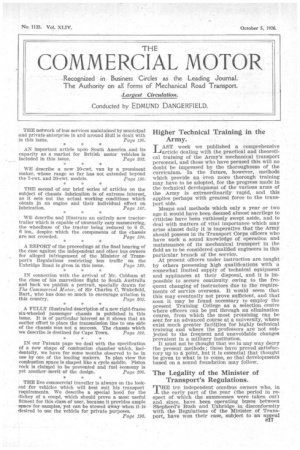Higher Technical Training in the Army.
Page 39

If you've noticed an error in this article please click here to report it so we can fix it.
L-VAST week we published a comprehensive -1-darticle dealing with the practical and theoretical training of the Army's mechanical transport personnel, and those who have perused this will no doubt be impressed by the thoroughness of the curriculum. In the future, however, methods which provide an even more thorough training may have to be adopted, for the progress made in the technical development of the various arms of the Army is extraordinarily rapid, and this applies perhaps with greatest force to the transport side. Means and methods which only a year or two ago it would have been deemed almost sacrilege to Criticise have been ruthlessly swept aside, and to deal with matters of vital importance which may arise almost daily it is imperative that the Army should possess in its Transport Corps officers who have such a sound knowledge of operation and maintenance of its mechanical transport in the field as to be considered qualified engineers in this particular branch of the service. At present officers under instruction are taught by others possessing high qualifications with a somewhat limited supply of technical equipment and appliances at their disposal, and it is impossible to secure continuity owing to, the frequent changing of instructors due to the requirements of service overseas. It would seem that this may eventually not prove sufficient, and that soon it may be found necessary to employ the present Training College as a selection centre where officers can be put through an elimination course, from which the most promising can be sent for an advanced course at a university, where exist much greater facilities for highly technical training and where the professors are not subjected to the frequent and unavoidable changes prevalent in a military institution. It must not be thought that we in any way decry the present methods ; these have proved satisfactory up to a point, but it is essential that thought be given to what is to come, so that developments based on a sound foundation may follow.












































































































